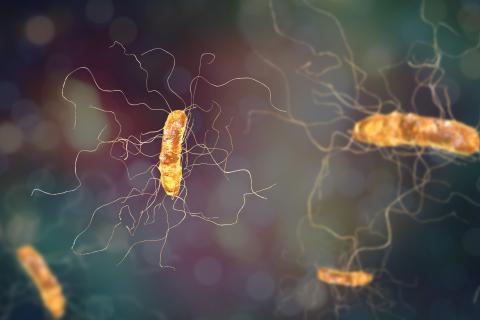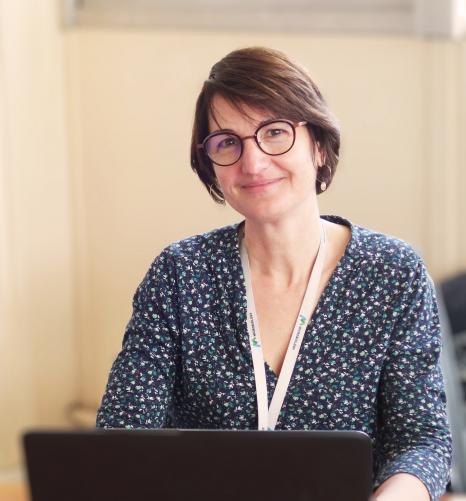
Claire Janoir: Defeating the virulence of the bacterium Clostridioides difficile
Claire Janoir is a research professor at the School of Pharmacy at Université Paris-Saclay and manages a team which, in 2020, became part of the Institute for Food Microbiology for Human Health (MICALIS - Université Paris-Saclay, INRAE, AgroParisTech). All the researchers within the team study, with different focuses, the enteropathogenic bacterium Clostridioides difficile, which is largely responsible for infections occurring within the healthcare system. Claire Janoir also jointly manages the MBVP Master 2 in microbiology (bacteria, viruses, parasites) and has been deputy director of the Graduate School (GS) Health and Drug Sciences at Université Paris-Saclay for several months now, where she is in charge of training and professional integration.
Since 2017, the bacterium C. difficile has been classed as one of the three most threatening pathogens by the Center for Disease Control and Prevention (CDC). It infects the human colon and is the cause of hospital-acquired diarrhoea, severe forms of which are fatal in 3% of cases. In addition, the danger of relapse is very significant. A patient infected with C. difficile has about a 25% chance of getting sick again. What is even worse is that the more relapses a patient has, the more likely they are to have them again. “Some patients have more than ten episodes of diarrhoea, which is very disabling,” laments Claire Janoir. Strangely, this bacterium is not very well-known amongst the public. “The community-acquired infections it causes are probably underestimated as they are rarely looked for since it is an obligate anaerobic bacterium, i.e. it is not found if it is not specifically looked for,” explains Claire Janoir. The bacterium is developing forms of resistance. “Contamination is by spores, the strain of which is particularly resistant to some of the disinfection regimes in hospitals. This leads to an extremely high level of contamination in the surrounding environment.”
Tracking bacterial behaviour...
“We are trying to understand the mechanisms behind its virulence while trying to gain some ground in terms of innovative treatments,” outlines Claire Janoir. Among the team's four lines of research, the research professor is working on how C. difficile settles in the human colon and the impact of this choice of location on its virulence. “We are currently studying its ability to form biofilms. Three years ago, we developed a biofilm model using monoxenic mice. Today, we are developing other tools to observe synergistic or antagonistic interactions with other bacteria in gut microbiota.” This work is part of the DifBioRel project which has begun at the start of 2021 in partnership with two teams from the Pasteur Institute.
...to provide better care
Gut microbiota is now the focus of much scientific and medical attention. “Fecal transplantation is highly effective in cases of reoccurring C. difficile infections, but the mechanisms underlying this effectiveness are not yet fully understood,” explains Claire Janoir. “As part of our merger with the Micalis Institute, who are specialists in microbiota, we have started on a new line of research to try and understand why.” Other projects are under way focusing on innovative treatment and on regulating inflammation using mature microRNAs in particular, as well as searching for new targeted treatments and vaccines.
A career spent 100% at the School of Pharmacy
Claire Janoir started her university education at Université Paris-Sud, where she enrolled on a pharmaceutical course. At that time, she wanted to become a neuroscience researcher. However, in her third year, she fell in love with bacteriology and became fascinated with antibiotic resistance. She defended a thesis on the subject in 1998 and subsequently obtained a position as a lecturer in the Faculty of Pharmacy.
It was a shock to go from antibiotic resistance to the virulence of Clostridioides difficile. “As its name suggests, this bacterium is difficult to work with,” points out Claire Janoir. “And virulence is a very different thing to antibiotic resistance. It doesn’t involve the same techniques and there are more parameters to take into account.” With her teaching load and her new area of research, the researcher overcame a difficult first year. She then slowly developed her own lines of research - for example, the control of bacterial colonisation factors according to environmental conditions and the host. In 2007, she obtained her ‘Habilitation à diriger des recherches’ (HDR - authorisation to direct the research of others - a post-doctoral degree). Six years later, she became a professor and in 2015 took on the management of the Master’s course in Microbiology and of the laboratory.
The story continues in Paris-Saclay
In March 2020, Claire Janoir became deputy director of the Graduate School Health and Drug Sciences and became responsible for training and professional integration. “This extraordinary journey changes every day! It’s a very challenging project which requires a huge amount of human investment,” points out the researcher. “The structuring of the Graduate Schools on which Université Paris-Saclay relies for the development of its research and training strategy, the coordination with the interdisciplinary programmes currently being developed with other stakeholders in Paris-Saclay, the development of training and the anticipation of tomorrow's professions and the needs of companies in terms of initial and continuing training are all exciting challenges.” Claire Janoir is also looking ahead to the start of the 2021/2022 academic year and the return of students to the Faculty of Pharmacy, which will take place on 1 October 2021 if health restrictions allow, coupled with the graduation ceremony for students who graduated in 2019-2020. Special fun events (escape game on the theme of medicines, a rally to explore the site, visits to laboratories by PhD students) will also form a part of this day.
The pleasure of teaching
“The job of a research professor is amazing. Despite the present difficulties (remote working and lectures via video conferencing), I love this demanding, but very intellectually stimulating role where you have a lot of freedom. The combination of research and teaching means that you stay in contact with young people. For me, that’s such a precious thing,” Claire Janoir says. “Unfortunately I don't have much time for research these days, but teaching is what I enjoy most!” The research professor really enjoys challenging and encouraging her students. “I tell them to keep going and to never have regrets. You always have a second chance. The future is never clear-cut, even if it requires some effort.”

